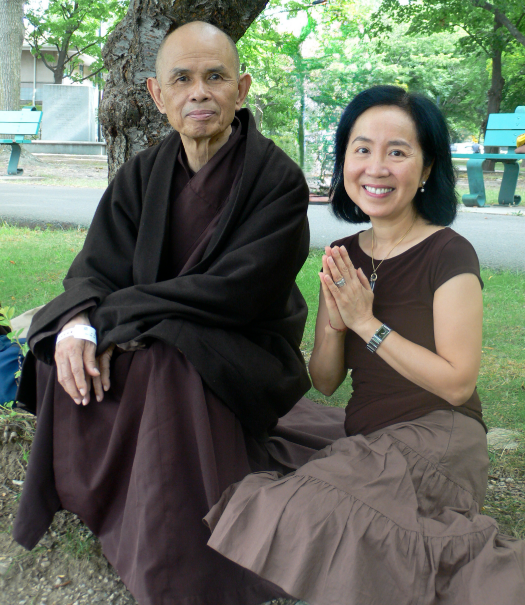While Buddhist monks and research scientists may not seem to have much in common, both groups can point to numerous physical and mental health benefits of mindfulness—the ancient Buddhist practice of remaining centered, calm, and fully present in the here and now. Scientific studies have shown that mindfulness can help decrease the risk of heart attack or stroke, reduce anxiety, and change the size of regions in the brain linked to memory, sense of self, empathy, and stress.
Supported by a generous gift from an anonymous donor and launched in April 2023, the Thich Nhat Hanh Center for Mindfulness in Public Health at the Harvard T.H. Chan School of Public Health aims to explore the burgeoning science behind how mindfulness—often narrowly seen as a solitary practice of individual meditation and reflection—can be harnessed more broadly to advance public health and societal well-being. By focusing on mindfulness research across fields including neuroscience, nutrition, the environment, health policy, and epidemiology, the center aims to share strategies, programs, and policy recommendations to empower people around the globe to live longer, healthier, and happier lives.
“I am so pleased that this new center will enable the scientific study of mindfulness in the context of public health. We are looking forward to establishing the center as a hub of rigorous inquiry and to collaborating with colleagues around the world to advance the science of mindfulness,” says Walter Willett MPH ’73, DrPH ’80, the center’s director and professor of epidemiology and nutrition at the Harvard Chan School.
Based in the Department of Nutrition, the center will serve as a nexus of evidence-based scholarship, research, and teaching on mindfulness, with a specific focus on nutrition and the environment.

Mindful approaches to living can help people feel more connected to themselves and the world around them. Techniques such as breathing exercises, meditation, and applying intentionality in everyday activities like eating and walking often cultivate a nonjudgmental self-awareness of inner emotional states and our surroundings. With practice, these exercises help people to stay grounded in the moment, reduce stress, and enhance feelings of well-being.
In addition to the individual benefits, the concept of “mindfulness beyond oneself” is an awareness of the interconnectedness of the world around us and how personal decisions can have a positive global impact. For example, consuming less meat is a mindful dietary choice that not only improves one’s cardiovascular health but also helps mitigate climate change, as industrial production of livestock is a major source of greenhouse gas emissions.
The center is named in honor of the late Thich Nhat Hanh, a Zen Buddhist master, teacher, and poet from Vietnam who helped popularize mindful practices around the world. A peace activist and champion of human rights, he was nominated for the Nobel Peace Prize by Martin Luther King Jr. Principal to his teachings was “engaged Buddhism,” a nonsectarian social movement that conveyed Buddhist concepts grounded in compassion to implement changes in politics and society. Thich Nhat Hanh wrote many books, including The Miracle of Mindfulness, a landmark text that included meditation exercises to increase feelings of joy and peace. He passed away in 2022 at the age of 95.
“We will rigorously study the science of mindfulness, but we will also seek to share the benefits of mindfulness with all people around the world, just like Thich Nhat Hanh did,” says Lilian Cheung SM ’75, ScD ’78, director of mindfulness research and practice in the department of nutrition at the Harvard Chan School, who co-authored a book on mindful eating with Thich Nhat Hanh. “We will show them how to incorporate the principles of mindfulness in their own lives—to improve their health, the health of people around the world, and the health of the planet.”




